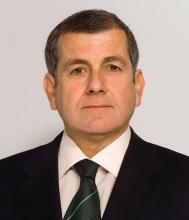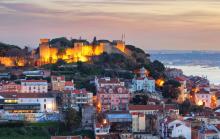Twenty years ago Portugal was bottom of the European league in terms of roads and safety. A series of ambitious plans has seen the country rise to the top. Patrick Smith reports on how this was achieved
In Portugal, out of 3,600km of main national roads (IP+IC), some 1,500km of motorways/high-capacity routes are financed under public-private partnership (PPP) agreements. These are tolled either using shadow tolls (these are being phased out) or real tolls, and plans are in hand to make routes multi free-fl

Dr Vasco de Mello, Chairman, BRISA
Twenty years ago Portugal was bottom of the European league in terms of roads and safety. A series of ambitious plans has seen the country rise to the top. Patrick Smith reports on how this was achieved.
In Portugal, out of 3,600km of main national roads (IP+IC), some 1,500km of motorways/high-capacity routes are financed under public-private partnership (PPP) agreements. These are tolled either using shadow tolls (these are being phased out) or real tolls, and plans are in hand to make routes multi free-flow electronic toll collection (ETC) lanes.Portugal has got a national road network of 16,500km, and the municipalities have their own road networks totalling 90,000km (they are responsible for the investments, maintenance and upgrading of the roads not included in the National Road Plan/NRP), and more recent plans for the country include the government's decision to build Lisbon's new international airport on the southern bank of the Tagus, and a new road/rail bridge between Chelas and Barreiro, which will be the third crossing of the Tagus.
Although the process of a NRP was started in 1978, it was not until 1985 that a new classified National Road Network came up with a hierarchical structure to meet the needs of existing and projected traffic demand. This consisted of major roads (IP = 2,600km), complementary roads (IC = 3,500km) and other roads (5,300km) totalling some 11,400km.
In 1985, approval of a new NRP combined with the funds from the
The socio-economic development following joining the EU, led to the revision of the NRP in 1998, and among its objectives were the definition of a national network of 3,300km of motorways; the integration of 5,000km of regional roads; development of a programme of construction of bypass roads; the implementation of road safety audits, and installation of information systems and traffic management.
The National Road Network has a total length of about 16,500km of which 3,300km are motorways.
From 1999-2008, the major goal was the construction of the motorways network, and some 1,300km were constructed in order to complete routes Valença-Castro Marim; Peniche-Castelo Branco; Lisbon-Caia and Viana do Castelo-Vila Real, as well as Apulia-Braga, and Lisbon-Cascais along with others including the Radial de Sintra.
To achieve this level of implementation an ambitious concessions programme was developed using PPPs (
Brisa is the company that holds the largest road concession granted by the Portuguese government, and it constructs, maintains, and operates the country's main network of tolled expressways. Its 1,100km highway network encompasses a major north-south expressway along the Atlantic coast, a circle of roads around Lisbon, and a highway that reaches east from Lisbon to the Spanish border. Founded in 1972 when it was granted a 30-year concession by the government to design, build, manage and maintain express motorways (220km by 1985), Brisa was nationalised in 1975 and privatised in 1997, and is one of the companies that have played a key role in bringing Portugal's once-neglected transportation infrastructure up to date.
Dr Vasco de Mello, chairman, said: "Basically, Brisa was almost a state company with very limited participation from private investors from 1985 to 1997. However, with the framework that was presented by the National Road Plan, Brisa has been one of the driving forces behind the development of the sector.
"We have grown from a company with a network of 150km of motorways to one with some 1,100km [it has 1,682km of concessions in Portugal and is a controlling shareholder of CCR in Brazil, with another 1,846 km], and we introduced new standards of construction quality, not only in design but in terms of materials used, taking into account the needs for future maintenance in view of the increase in traffic." In 1991, the company trialled the innovative Via Verde (green lane) electronic toll collection system in Lisbon and this was introduced in all toll booths in 1995.
"We have 2.2 million people using our Via Verde tags, representing a penetration ratio of more than 62%, and this is the highest level of toll automation at a national scale worldwide. Along with this we have developed a state-of-the-art traffic management centre at our head office in Lisbon [it overlooks the A5 which runs 40km to the coast] from where we control and coordinate operations for the whole network," said Dr Vasco de Mello.
"Brisa has always promoted the partnership model and has actively participated in all the Portuguese tenders for tolled highways. We are also participating in a diversification project: the high-speed train link, which will run from Poceirão, near Lisbon, to Caia on the Spanish border and then on to the capital Madrid." Now, seven sub-concessions have been drawn up with an investment of around E7 billion for work on some 2,200km of the road network: 1,000km are for new infrastructure (40% with tolls). More recently,
Professor João Bento, president of the Portuguese Association of Concessioned Tolled Motorways (
"We have three technical committees on pricing and tolling; road safety and the environment and
Outlining the efforts relating with the furthering of technology usage in road operations by Brisa - as a example of what Portugal has been able to perform in recent years - namely around the company's innovative control centre, he said it controls Brisa's entire network using 550 CCTV cameras, 200 variable message signs, 40 weather stations, 1000 call boxes and 90 road assistance vehicles (indeed, there are 15,000 devices permanently active 24x7), from a single site.
"We have about 260 events each day requiring dedicated management, and although many are not serious accidents, everything is recorded in our system and all the response plans are triggered from there: road assistance, works, accidents, incidents - we manage 1,500km from a single room."
Between 1985-2008, some 3,600km of new roads, of which 2,700km have a motorway profile, have been constructed, and the density of motorways increased from 2-30km/1,000km² and from 2km/million inhabitants to 271km/million inhabitants: of the 18 district capitals, only three (Bragança, Portalegre and Beja) are not yet served by motorway.
Minister Lino added: "Transport infrastructure is very important for Portugal because we are a peripheral country in Europe and we want to be properly linked to Europe. We must have good highways, airports, roads and ports to facilitate the movement of people and goods.
"Portugal is one of the main ports into Europe with traffic coming from North and South America and Africa. We can play an important role in the world transport system."









